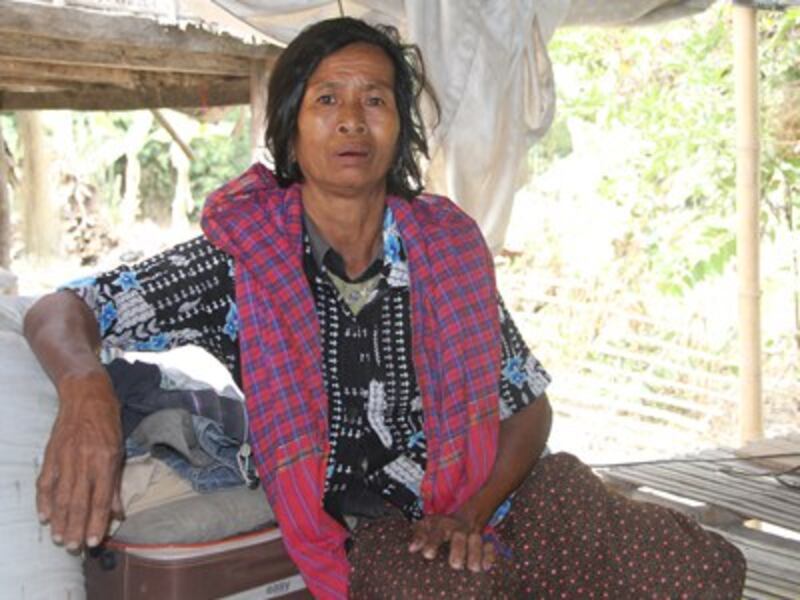The family of two Cambodian women who were sent by a local employment agency licensed by the government to work in Malaysia has appealed to national police and a domestic rights group to help free the pair after Malaysian authorities jailed them for trying to escape from the company when they discovered that it intended to “sell” them.
The two women, whose names and ages were not provided to RFA’s Khmer Service, are from Mesang village, Romdeng commune, of Mesang district in southeastern Cambodia’s Prey Veng province. They were recruited last July by 168 Manpower Supply Co. Ltd., headquartered in the capital Phnom Penh, supposedly to work as fruit sellers in Malaysia.
The sisters expected the jobs to pay them salaries higher than they could earn at home so that they could better support their family.
But the two women and their family members have accused the company of claiming to send Cambodians to legally work in Malaysia, but instead trafficking them for sale.
“They were tricked by 168 Manpower Supply, which promised to send them to Malaysia to work as fruit sellers and receive high salaries,” said Ut Troeuk, the 63-year-old mother of the two women, who also lives in Mesang village.
The company did not ask her for any money to send her daughters to Malaysia for work, she said, but once they traveled through Thailand by bus and arrived at their destination with six other Cambodian women, they realized they had been trafficked and tried to escape.
Malaysian authorities picked them up and jailed them, she said. The two sisters have now been in detention for six months, while the others have been released.
Action promised
The family has asked the Cambodian government to intervene in the matter to free the women and have them returned home.
The Cambodian National Police and its specialist Anti-Human Trafficking and Juvenile Protection Police unit have pledged to take action, Ut Troeuk said.
“If I had [Prime Minister Hun Sen’s] phone number, I would call him and ask him to help bring my children back, because I feel pity for my daughters,” she said. “They are so skinny, and they are sick.”
Gen. Chiv Phally, deputy director of the Anti-Human Trafficking and Juvenile Protection Police, told RFA he had not received the complaint, but said he would cooperate with the family to work with the Ministry of Foreign Affairs to take legal action against the perpetrators.
“We will investigate it, and if we find them, we will rescue them right away according to legal procedures, and we will arrest the perpetrators so they can be prosecuted,” he said.
Ut Troeuk also appealed to domestic rights group Adhoc on Jan. 29 to help free her daughters.
Eang Kimly, Adhoc’s coordinator in Prey Veng province, said she welcomes additional efforts by authorities to step in and help the two women return to Cambodia
“If the women can be saved, the victims’ family as well as nongovernmental organizations would be happy, because being in a Malaysian jail must be hard for them.”

Local authorities are no help
The family of the victims said they have filed complaints with local authorities, but their efforts have not yet yielded any results.
Mesang district chief On Sonoeun said he had filed a complaint about the jailing of the two women with the Provincial Committee for Combating Human Trafficking, but did not know whether the members would take action.
“The Provincial Committee for Combating [Human] Trafficking and Labor Department received the complaint several months ago, but I don’t know how the investigation is going,” he said.
Ut Troeuk burst into tears when she said Malaysian authorities had arrested and jailed her daughters because they tried to escape from the company.
“They had realized that they had been taken there to be sold,” she said. “Then, at about 10 p.m., the police just arrested them [when they tried to escape],” she said.
168 Manpower Supply processed passports for her daughters and paid for their food and clothes, she said. The company also said it would pay Ut Troeuk U.S. $250 in cash, though she never received the money.
RFA could not reach the company for comment.
Calls demanding money
Ut Trouek said she hadn’t heard anything from her daughters after they had left Cambodia until they called her to say they were in jail.
Their sister, Ol Nhanh, told RFA that after her younger siblings were detained, she had received strange phone calls from people telling her to send them money to get her sisters released and buy air tickets so they could return home.
Some of the callers claimed to be from the Cambodian embassy in the Malaysian capital Kuala Lumpur, while others claimed to be fellow inmates who had just been released, she said.
Malaysian authorities had released the other six Cambodians who had entered the country with the two women, after their families sent money to the Cambodian embassy to help secure their freedom, Ut Trouek said.
Ut Troeuk, who sells pickles for a living, said she doesn't have the money to pay to have her daughters freed. Nevertheless, she has asked the Cambodian embassy to intervene.
Radio Free Asia tried to contact Chum Sunry, spokesman of Cambodia's Ministry of Foreign Affairs, several times, but no one answered the calls.
The Cambodian government has enlisted a number of private recruitment agencies to find citizens jobs abroad to reduce the high number of illegal migrant workers who sneak across the border to Thailand to work in the construction, manufacturing, fishing, hospitality, and agriculture sectors.
Some companies reportedly collect hundreds of U.S. dollars from workers who want to obtain passports, visas, and transportation to Thailand for jobs, according to a report in The Cambodia Daily in August 2014.
But the recruitment agencies largely operate without government oversight of their legal procedures and the prices they charge for their services.
Reported by Tha Thai for RFA’s Khmer Service. Translated by Pagnawath Khun. Written in English by Roseanne Gerin.
